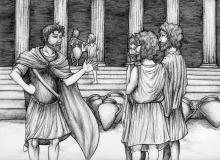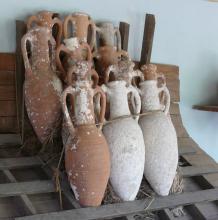Hannibal flees to Crete, where he uses a clever ruse to save his money from the treacherous inhabitants.
(1) Antiochō fugātō: ablative absolute. Nepos refers to Antiochus’ defeat at the Battle of Magnesia in western Asia Minor in 190 BC. The Roman forces were led by Lucius Cornelius Scipio, the brother of Scipio Africanus. Antiochus subsequently agreed to onerous terms of peace: he renounced his claim to any land in Europe and Anatolia west of the Taurus Mountains, paid a massive indemnity, handed over all of his war elephants, reduced his navy to only 12 warships, and agreed to deliver Hannibal.
nē dēderētur: fear clause dependent on participle, verēns (AG §564); nē indicates that Hannibal fears the action in the clause, "fearing that he be betrayed."
quod: refers to the action of the preceding clause (dēderētur).
accidisset: impersonal, "it would have happened."
sī suī fēcisset potestātem: an idiom, "if he (Hannibal) had provided [Antiochus] the opportunity (potestātem) [to meet] him (suī)"; suī, objective genitive, referring to Hannibal. Hannibal fled first to Armenia, where he was said to have founded the city of Artaxata.
Crētam ad Gortȳniōs vēnit: Crētam: accusative of place to which, usually with a preposition, unlike domum, rūs, and the names of towns and small islands (AG §427.2). ad Gortȳniōs: "to the Gortynians." Gortyn was an ally of Ptolemaic Egypt and an important city in south-central Crete, near the foot of Mt. Ida. At this time, Crete was riven by conflict between several powerful city-states.
ut ibi...cōnsīderāret: purpose clause.
quō: adverb, "to where, whither," introducing indirect question dependent on consīderāret.
(2) vir omnium callidissimus: i.e., Hannibal; recall that Nepos characterized Fabius Maximus with the same adjective (5.2).
in magnō sē fore perīculō: indirect statement introduced by vīdit; note how Nepos artfully embeds the accusative subject (sē) and verb (fore = futūrum esse, see 2.4) within the prepositional phrase, in magnō...perīculō.
nisi quid: = nisi (ali)quid; see 2.6.
propter avāritiam Crētēnsium: explains why Hannibal thought that in magnō sē fore perīculō. Crētēnsium: genitive plural > Crētēnsis.
sēcum: typical for cum sē, as whenever cum appears with a personal pronoun (e.g. mēcum, nōbīscum, etc.).
fāmam: accusative subject of exisse; here, "report" or "rumor" of his magnam pecūniam.
(3) capit…complet…operit: historical presents to convey a sense of lively narrative (AG §469; see note on 4.3).
amphorās: large earthenware vessels with two handles that were used for transport and storage. [image: Amphorae; Cicak, Hannibal's Ruse; Leech, Hannibal and his Bankers]
plumbō: an ablative of means may be used with verbs and adjectives of "filling, abundance, etc.," complet (AG §409a; 11.6); the same construction appears two sentences later: suā pecūniā complet.
summās: "the tops" (of the amphorae).
hās: i.e. amphorās; on its position before the ablative absolute, praesentibus prīncipibus, see 8.2.
praesentibus prīncipibus: ablative absolute; since Latin lacks the present or perfect participle of esse, an ablative absolute can consist of a noun and adjective or two nouns in the ablative, as here (AG §419a; 2.3, 7.2, 12.2).
in templō Diānae: Nepos uses the Roman name of the Greek goddess Artemis.
crēdere: infinitive with an accusative subject, sē; "pretending (simulāns) to entrust an accusative (suās fortūnās) to the dative (fideī);" fidēs: not “faith” but “reliability” → “trustworthiness” → “good faith”; compare the derogatory expression Pūnica fides (“Punic trustworthiness” → “bad faith” → “treachery”).
illōrum: i.e., the assembled leaders of the Gortynians (praesentibus principibus).
hīs in errōrem inductīs: ablative absolute.
eāsque: i.e., statuās aeneās.
domī: locative, "at home" (AG §427.3).
(4) Gortȳniī: subject of custōdiunt.
magnā cūrā: ablative of manner.
nōn tam ā cēterīs quam ab Hannibale: correlatives, "not so much from...as from...."
īnscientibus iīs: ablative absolute; iīs, i.e. Gortȳniīs.
nē...tolleret...dūceret: understand amphorās as the object of both verbs in the negative purpose clause. tolleret...dūceret: imperfect subjunctives in secondary sequence after historical present, custōdiunt (AG §485e).




